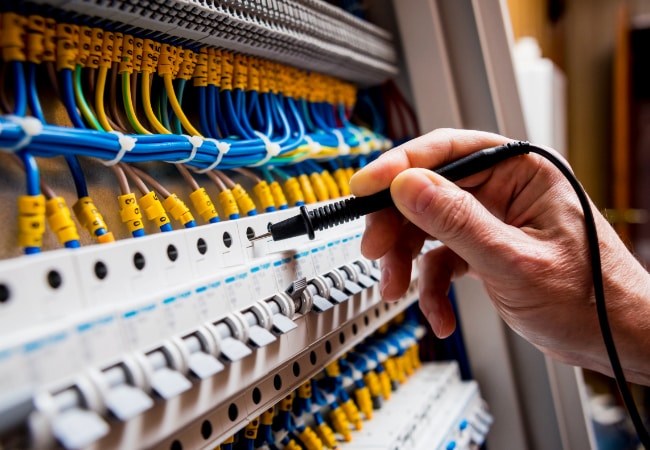CCSS carries out thousands of EICR tests every year for businesses and landlords across the Midlands and North of England, but what is an EICR?
An electrical installation condition report (EICR), or periodic inspection report as they used to be called are often referred to by customers as a Landlord Safety Test or Homebuyers Test.
Your home, business and any property you rent out should be covered by an electrical installation inspection report. Although it’s not a legal requirement to have an Electrical Condition Report many legal documents such as a Fire Risk Assessment, refer to an Electrical Condition Report as a way of satisfying their requirements, the Electricity at Work Act is another.

In the event of an incident where a tenant or an employee is hurt by the electrics in your property claiming that you were unaware of the condition of the electrical installation is not a suitable defence.
Some insurance companies will insist an Electrical Condition Report before providing cover, especially where workers or the public are concerned.
During an EICR, the electrical distribution board or consumer unit, wiring and electrical accessories are thoroughly tested and inspected for faults or deviations from the Wiring Standards. Throughout the test, the following will be inspected and tested:
- The adequacy of the earthing and bonding.
- Devices for protection against fire and electric shock.
- Any damage or wear and tear that might affect the safety of the property’s inhabitants.
- Identification of any damaged electrical fittings and accessories.
- Identification of any exposed live wires that could cause a fire or injury.
Many faults like the cables in your building are hidden and can’t be seen simply by looking and are only picked up during testing.
If you want to know more or book a free survey
An EICR test should only be carried out by a skilled and competent registered electrician with the specialist qualifications that not all electricians have.
The test undertaken to become competent is very exacting and many highly experienced electricians have been known to fail.
Recommendations for the frequency of testing vary depending on building type and use, the following can be taken as a good guide
Homeowners –BS7671 (18th Edition Wiring Regulations) recommend having an EICR carried out at least every 10 years.It is also important to have one done if you are moving out or into a new home, if your insurance requires one – or if you suspect your current electrics are old, faulty or have been subject to poor quality additions.
The only exception to this is if the property has a swimming pool – this should ideally be tested once every year.
Rented Homes - Under the ‘Landlord and Tenants Act (1985) landlords must ensure that the electrical installation in a rented property is maintained safely throughout a tenancy. To ensure this, BS7671 recommend an EICR test at change of tenancy or at least every 5 years.
Businesses – Whilst it is not a legal requirement to have an EICR, as an employer you will be undertaking regular fire risk assessments and any competent fire risk assessor will be able to offer advice on the age and appearance of fuse boards etc. that could compromise the fire risk within your property. As an employer you have other obligations under under the 1974 Health and Safety at Work Act stating that employers are ‘responsible for the health and safety of their employees’ and the ‘Electricity at work regulations’ which required that precautions must be taken against the risk of injury from electricity used as part of work activities. BS7671 recommend having an EICR undertaken at least every 5 years.


